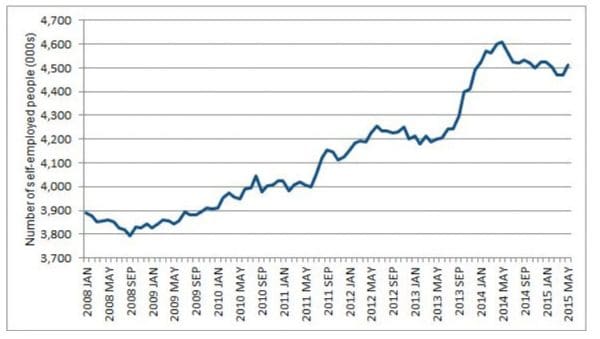In recent years, the UK has seen a more flexible labour market. One phenomena is the growth in self-employed contractors. This category of workers have different rights to employees. Self-employment can be attractive to workers seeking greater flexibility. But, there is also concern firms are using the categorisation of self-employment as a bogus method to pay their workers lower wages, reduce rights to sick pay and avoid the need to employ for fixed numbers of hours per week.
Levels of self-employment in UK

Self-employed contractors are responsible for paying NI and income tax. Self-employed contractors are responsible for paying tax, are not eligible for the same level of work related benefits, and they are not covered by the minimum wage.
A survey by Citizens Advice last August suggested that as many as 460,000 people could be wrongly classified as self-employed.
Evidence of falsely classified self-employed workers
- Only work for one company. The company do not allow you to work for anyone else. Self employed workers should be free to work for any number of companies.
- Cannot choose working pattern
- Cannot choose when to work
- Workers who were employed, but were told by company they would have to reclassify as self-employment
Rights self-employed workers don’t have
- No right to national minimum wage
- No right to holiday pay / sick pay / maternity pay.
- Will not be auto-enrolled in a pension scheme
- Will not have the right to take employer to an employment tribunal for unfair treatment
- Self-employed can be eligible for benefits like universal credit and housing benefit, but some benefits can be harder to claim.
Examples of self-employment grey areas.
Cycle couriers
In this BBC article on Cycle couriers, they highlight a group of workers who work up to 50 hours a week for one company, are not allowed to work for anyone else, but are hired as self-employed contractors. This means the firm can pay £3 per delivery – rather than the national minimum wage.
Amazon flex
Amazon has employed many delivery workers as independent contractors. It allows the contractors to choose flexible times of work. Amazon is under no guarantee to offer minimum hours of work and the usual work benefits. With payment related to delivery, there is an opportunity for hourly pay rates to vary depending on how long it takes to deliver.
Implications of growing numbers of self-employed contractors
- Employment opportunities. Despite the weak economic recovery, self-employment has helped create new jobs and lead to a quicker fall in unemployment than after previous recessions.
- Flexible hours and contracts can suit some people. Flexi-time can help people with family commitments work part-time on in hours that suit them.
- Firms can be encouraged to employ more workers, due to the lower costs of employment.
- Increased productivity. With firms paying piecemeal – e.g. paying per delivery, there is an incentive for people to maximise productivity and delivery rates, rather than an hourly minimum wage where less incentives would be present.
Problem of self-employed contractors
- Some firms taking advantage of employment situation to avoid paying statutory sick pay and holiday pay.
- Workers who fall ill have little protection under self-employed contracts.
- Firms can avoid paying the national minimum wage. With the rise in the living wage, this could be a growing problem.
- The definition of employment vs self-employment is a grey area. Some firms are fearful that reclassification of workers could incur higher costs in the future. But, there is a lack of clarity over employment status.
- Quality of work may suffer. With drivers paid low delivery rates, it encourages them to cut corners to get the job done quicker. This can lead to delivery drivers speeding, cycle couriers going through red lights e.t.c.. To make work pay, there is a constant time pressure to deliver quicker.
- Lost revenue for the Treasury. Self-employed workers generally pay lower NI and income tax (can claim expenses). According to Citizen’s Advice survey, the exchequer could be losing £300 per self-employed worker.
- Growing uncertainty of workers who are self-employed and not certain about their employment rights.
- Less hours. Self-employment makes it much easier for employers to reduce the number of hours, when business is slack. This can lead to volatile income. During quiet months, workers can see drop in regular income.
Related
- UK Unemployment mystery – why self-employment is part of puzzle
- Universal basic income
- Falling UK tax revenue
- Flexible labour markets

Fascinating article, it is interesting the different rights that are extended to freelancers and those that aren’t.